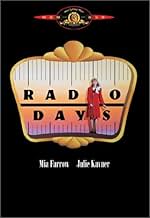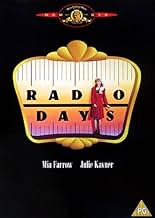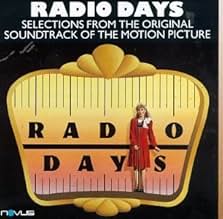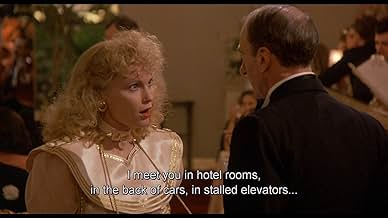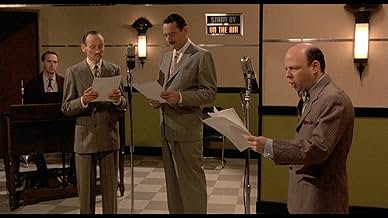Ein nostalgischer Rückblick auf das goldene Zeitalter des Radios, in dessen Mittelpunkt eine normale Familie und die verschiedenen Radiodarsteller stehen.Ein nostalgischer Rückblick auf das goldene Zeitalter des Radios, in dessen Mittelpunkt eine normale Familie und die verschiedenen Radiodarsteller stehen.Ein nostalgischer Rückblick auf das goldene Zeitalter des Radios, in dessen Mittelpunkt eine normale Familie und die verschiedenen Radiodarsteller stehen.
- Für 2 Oscars nominiert
- 3 Gewinne & 10 Nominierungen insgesamt
- Avenger Crook
- (as Michael Murray)
- Ceil
- (as Renee Lippin)
Empfohlene Bewertungen
I would like to think this family was really Woody Allen's, but it is probably a work of fiction, like his other pieces. But how tremendous that he can create (or remember) these people. As I watched it, one thought that kept recurring was that these were not "beautiful" manufactured people like we see in the media today; they had big hips and were fat and poor and... and none of that mattered. They were real. They were believable. You can't watch this movie without wondering what happened to them, did Aunt Bee find a husband? You cared about this family and personally, I wished they were mine.
The vignettes were sad and sweet. My favorite was poor departed Kirby Kyle; at least he had heart! And Leonard; and "donations for the promotion of a state in Palestine." So many memories that make us a part of a family most people never had. The viewer belongs to this warm and loving group.
Something has been lost with the concept of "nuclear family," with the lonely big houses and empty hours and unshared hopes and sorrows. Radio Days reminds us that having someone to experience life with is a treasure and a blessing, despite whacks on the head, martians, and fish, "That man always brings home fish!"
And oh, the music!
This is Woody Allen's masterpiece.
He takes the wonderful old songs and commercials from that time and weaves them into the story. I was completely captivated.
It's not a "laugh a minute" type film, but it also gets you thinking. Nevertheless, it has some hilarious scenes. Check out the Jewish fasting holiday scene. I've watched it at least 6 times and I still laugh. Also the scene with Mia Farrow's character was superb. One of my favorite lines is when she tells a top radio producer in her high-pitched nasal voice, "Jeez. We can't keep meeting like this. In the backs of cars, movie theaters and stalled elevators. You're gonna lose your respect for me!" I love this film.
I was anything but disappointed, but I knew what the film was all about before I saw it. Actually, what drew me to it was that I had read where this was a wonderful visual film, filled with rich colors and great set designs. It did not let me down. This is a great visual tribute to the 1940s, to be exact from 1938 to 1944. A real treat for the eyes.
The story centers around a Jewish family in Queens and the importance that radio shows had in that day-and-age. Also profiled in here are some of those radio performers.
It does have laughs but not as many as the normal Allen movie because the idea of this is simply to be a nostalgic piece, mainly Allen's tribute to his own family days of growing up, what it was like around his house.
It was interesting to see Seth Green playing Woody as a youngster with flaming red hair. The most interesting person, however, was Diane Wiest who played a man-chasing sister-in-law. The film gives you a real flavor of the period, of New York and of a Jewish family.
Overall, it's simply a nice film....and gorgeous to look at. Sometimes I think some of Allen's work is overrated but, boy, here is one that is definitely underrated.
The film is narrated by Woody Allen, and is a nostalgic--and possibly autobiographical--look at the childhood of a young boy growing up in Rockaway, Queens. Allen grew up in Brooklyn, but the culture and customs of lower-middle class Jews in Rockaway would have been similar to those that Allen probably witnessed in Brooklyn.
The movie is set in the late 1930's and early 1940's. Surprisingly, World War II doesn't hold a prominent place in the film. Although the war was thousands of miles away, no aspect of life in the U.S. was untouched by it. Allen chose to concentrate on other matters--failed hopes, unfulfilled romances, and family bickering.
Despite these negative aspects of day-to-day life, the film projects a cheery, upbeat attitude. After all, it was a time when someone who looked like Wallace Shawm could star as radio's "Masked Avenger." Woody's subdued narrative lets us know that he loved those around him and was loved by them in turn.
Life wasn't perfect, but it could have been worse, and who knew what good things the future might bring.
We saw Radio Days on DVD. It probably would work somewhat better on the large screen, but it's worth seeking out and seeing in any format.
Wusstest du schon
- WissenswertesThe story of Kirby Kyle, the ill-fated baseball player, is a parody of former Chicago White Sox pitcher Monty Stratton, whose promising career was derailed after he lost part of his leg due to a hunting accident. Stratton attempted a comeback and then retired. His life was made into a movie: The Stratton Story (1949).
- PatzerIn one scene, a pack of Camel cigarettes lies on a table, with a clearly visible bar code on the side of the package. The Universal Product Code would not be introduced until the 1970s.
- Zitate
[Last lines]
Narrator: I never forgot that New Year's Eve when Aunt Bea awakened me to watch 1944 come in. I've never forgotten any of those people or any of the voices we would hear on the radio. Though the truth is, with the passing of each New Year's Eve, those voices do seem to grow dimmer and dimmer.
- SoundtracksThe Flight of the Bumblebee
(1899-1900)
Music by Nikolai Rimsky-Korsakov
Performed by Harry James
Courtesy of CBS Records
Played during the opening credits
Top-Auswahl
Details
- Erscheinungsdatum
- Herkunftsland
- Offizieller Standort
- Sprachen
- Auch bekannt als
- Días de radio
- Drehorte
- Radio City Music Hall - 1260 6th Avenue, Rockefeller Center, Manhattan, New York City, New York, USA(Joe, his Aunt Bea and her date see a movie there)
- Produktionsfirmen
- Weitere beteiligte Unternehmen bei IMDbPro anzeigen
Box Office
- Budget
- 16.000.000 $ (geschätzt)
- Bruttoertrag in den USA und Kanada
- 14.792.779 $
- Eröffnungswochenende in den USA und in Kanada
- 1.522.423 $
- 1. Feb. 1987
- Weltweiter Bruttoertrag
- 14.792.779 $




